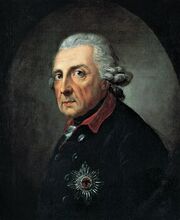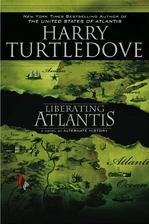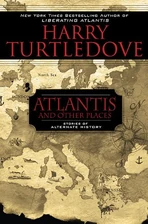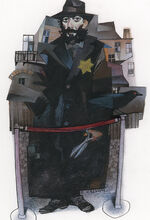| ||||||||||||||||||||||||||||||||||||||||||||
Frederick II, in German Friedrich II (24 January 1712 – 17 August 1786), from the Hohenzollern dynasty, was the third King of Prussia 1740–1786, the longest-reigning monarch of that kingdom. He became known as Frederick the Great due to his (largely successful) efforts both politically and militarily to make Prussia into a formidable power in Europe. He led his kingdom through the Seven Years' War against France, Austria, and Russia. During the 20th century, the Nazis made him one of their symbols, damaging his legacy in the years since World War II.
Frederick II in "Shtetl Days"[]
Frederick the Great was one of Adolf Hitler's heroes. After Germany won the War of Retribution, Frederick's friends, including Voltaire, enjoyed a glowing reputation in the Greater German Reich.
Frederick II in Atlantis[]
In the mid 18th century, King Frederick II of Prussia launched a global war with Russia, Austria, and France. Britain allied itself with Prussia.[1] Having no colonies in Atlantis, Prussia was not involved in the Atlantean theater of the war.
Frederick was still on the throne at the time of the Atlantean War of Independence, in which Prussia remained neutral. His style of direct rule was cited in a conversation between British Captain Horace Grimsley and Atlantean Army General Victor Radcliff as they negotiated the surrender of the British garrison after the Siege of Croydon.[2]
See also[]
- References to Historical Figures in Turtledove's Work, for more minor references.
References[]
- ↑ Opening Atlantis, pg. 266.
- ↑ The United States of Atlantis, pg. 381, HC.
| Royal offices (OTL) | ||
|---|---|---|
| Preceded by Frederick William I |
King in Prussia 1740–1772 |
Recreated as King of Prussia |
| Elector of Brandenburg Prince of Neuchâtel 1740–1786 |
Succeeded by Frederick William II | |
| New creation |
King of Prussia 1772–1786 | |
| Preceded by Charles Edzard |
Prince of East Frisia 1744–1786 | |
| ||||||||||||||||||||||||||||
| ||||||||||





